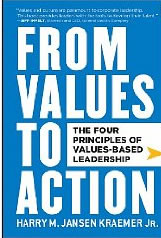Found on kellogg.northwestern.edu:
TEDxUNPLAZA co-curator and executive producer Kunal Sood invited Kramer so the audience could experience the passion and expertise Sood saw in Kraemer’s classroom. Sood is a student in the Kellogg Executive MBA Program.
Kraemer, also an executive partner at private equity firm Madison Dearborn, gave four leadership principles he developed while chairman and CEO of the $9 billion global healthcare company Baxter International Inc.:
- Self-reflection: “I think we can start to separate noise from what really, really matters.”
- Balance: “Seek to understand before you’re understood.”
- True self-confidence: “You surround yourself with people that are much better than you on the things you’re not that good at.”
- Genuine humility: “Remember the cube. Most of us, when we started in a cube, whenever that was, we knew how we wanted to be treated.”
As shown on thepersonalbusinessplan.com:
This practical guide to creating a defined and actionable plan to achieve success and happiness. It will give you the answers to these fundamental questions – and more:
- How do you balance your professional and your personal life?
- How do you get the most out of your high potential situation?
- How do you create a sustainable position for your family and yourself?
- How do you identify and focus on the important things in life?
- How do you avoid the emotional burnout from constantly giving to others?
- How do you get success?
- How do you find happiness?
From Values to Action hit #1 on 800ceoread's Business Book Bestseller List for the month of July.
]]>From Values to Action hit #1 on 800ceoread’s Business Book Bestseller List for the month of July.
]]>
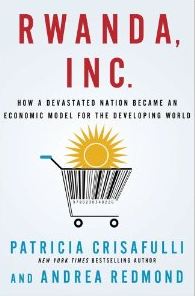
How To Eat An Egg In A Rebounding Rwanda
By Patricia Crisafulli & Andrea Redmond In a rural preschool at Rugarama in northern Rwanda, some two hours north of the capital city of Kigali, 90 or so three- to six-year-olds sit patiently on a grassy patch outside a crumbling one-room schoolhouse with only gaps where windows and the door should be. Having sung, prayed, counted, and chanted the days of the week and months of the year in their native Kinyarwanda and English (fluency in which is a national education goal), the children wait for the highlight of the day: a hard-boiled egg.]]>
How To Eat An Egg In A Rebounding Rwanda
By Patricia Crisafulli & Andrea Redmond
In a rural preschool at Rugarama in northern Rwanda, some two hours north of the capital city of Kigali, 90 or so three- to six-year-olds sit patiently on a grassy patch outside a crumbling one-room schoolhouse with only gaps where windows and the door should be. Having sung, prayed, counted, and chanted the days of the week and months of the year in their native Kinyarwanda and English (fluency in which is a national education goal), the children wait for the highlight of the day: a hard-boiled egg.
In a rural preschool at Rugarama in northern Rwanda, some two hours north of the capital city of Kigali, 90 or so three- to six-year-olds sit patiently on a grassy patch outside a crumbling one-room schoolhouse with only gaps where windows and the door should be. Having sung, prayed, counted, and chanted the days of the week and months of the year in their native Kinyarwanda and English (fluency in which is a national education goal), the children wait for the highlight of the day: a hard-boiled egg.
Firm taps of the shells against a ridge of rock produce a crack. Then the peeling begins. Some children take a bite as soon as the top is uncovered and then continue removing the rest of the shell. Others wait until the egg fully emerges. No one gobbles or grabs. Older children help younger ones. One little girl nibbles the white first and then savors the round ball of cooked yolk.
The eggs are no mere mid-morning snack. They provide an infusion of protein at a critical juncture in child development, particularly for these needy rural children. Even when there are sufficient calories in their diet, protein is often deficient, which can impair body and brain development. Eggs are a perfectly portable protein source with ample shelf-life, even at room temperature, and contain the right balance of amino acids for human consumption.
Distribution of eggs to rural Rwandan preschoolers in the country’s Northern Province is the work of a U.S.-based nongovernmental organization (NGO) called One Egg, working with Rwandan and stateside partners. On the ground in Rwanda, One Egg collaborates with the Anglican Shyira Diocese, which currently operates 217 child development centers, with plans to expand to 325. Of the 217, 15 of these preschools currently receive eggs—a number One Egg hopes will grow steadily through stateside donor support.
The eggs are procured by One Egg from a poultry farm outside Musanze, the largest city in the Northern Province, which is operated by Ikiraro Investments, a Rwandan corporation with backing from American social entrepreneur Tom Phillips, as well as technical support from poultry giant Tyson Foods TSN -0.07% and its Cobb-Vantress research and technology arm.
Significantly, there is no government money here and no foreign aid. Instead, there is the transfer of technology, know-how, and best practices at the poultry farm. The eggs, therefore, reflect the importance of eschewing traditional aid and handouts in favor of empowering partnerships that pursue good works aligned with the Rwandan government’s priorities for development, especially at the lowest socioeconomic tier. As we wrote in our book, Rwanda, Inc., the emphasis is on development that is pro-poor, as evidenced in the 1 million Rwandans raised from poverty between 2006 and 2011.
Admittedly, progress in Rwanda, which is in the midst of a strong comeback since the 1994 genocide—with milestones such as 8% GDP growth, universal health care, 12 years of compulsory education, and the expectation that it will meet virtually all its United Nations Millennium Development Goals by 2015—starts at square one with incremental gains. The same can be said for the Shyira Diocese’s child development centers, where there is far more need than the means to deliver eggs. A harsh example is at Mugera on the Ugandan border where a mud-brick schoolhouse with a dirt floor is accessible only by a narrow rutted track that could never be called a road. There, children recite the same songs, prayers, and vocabulary lessons as at Rugarama, but there is no egg feast at the end.
As for those without egg deliveries as yet, the centers themselves, no matter how humble, are at least a start toward attaining the diocese’s four-fold goals, as explained by Bishop Laurent Mbanda: child security, with a safe environment for young children whose mothers work the fields; education, including an introduction to basic English; spiritual development; and nutrition.
Although the need is great, it cannot overshadow what is happening now: the diets of 1,500 rural preschoolers are supplemented with protein. Even anecdotally, children who receive the eggs show signs of physical and cognitive gains.
The intention is strong and the partners are committed to tackle poverty, nutrition, and child development issues among Rwanda’s poor—with more brown-shelled eggs, hard boiled over a wood fire at a rural preschool, resting in the palm of a child’s hand.
]]>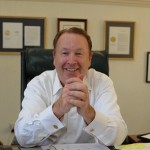 As seen on A Closer Look with Pam Atherton:
As seen on A Closer Look with Pam Atherton:
The world is changing at breakneck speed. Jeffrey Fox says, as a leader, it’s not enough to be a traditional CEO anymore, we need to be transformative.
The consummate storyteller, Jeffrey shares insight and gives us the backstory on high-performing CEOS’s such as Jim McCann from 1-800-FLOWERS, and Paul Mitchell’s John Paul Dejoria.
Click here to listen to the interview.
]]>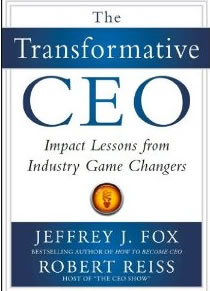
As seen on:
http://www.prweb.com/releases/2013/7/prweb10903065.htm
In an exclusive interview, Robert Reiss, the coauthor of the “Transformative CEO: Impact lessons from industry game changers”, and host of the nationally syndicated weekly radio show CEO Radio Show and The CEO Show, recently sat down with Russell Sarder, CEO of NetCom Learning and SarderTV to discuss his book and his thoughts on learning. The interview which is part of the database of SarderTV, includes a discussion on the book Robert Reiss co-wrote with Jeffery J. Fox, the author of How to Become a CEO, and Reiss’s philosophy on how CEO’s can share their wisdom with entrepreneurs, the business world and up and coming organizational management.
Click here to watch the interview.
]]>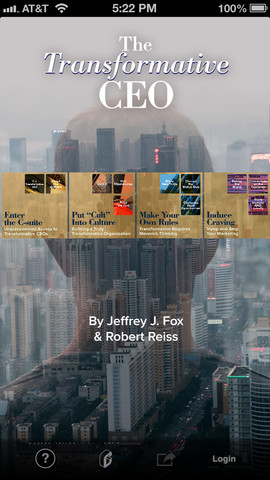
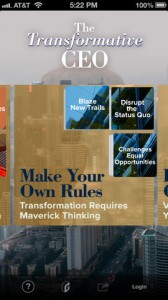
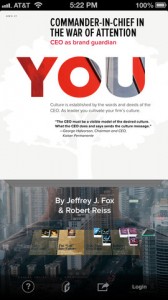 Concepts are divided into sections, each are arranged like a deck of cards so users can flip through them.
Check out the App: https://itunes.apple.com/us/app/citia-the-transformative-ceo/id660265519?mt=8&ign-mpt=uo%3D2.]]>
Concepts are divided into sections, each are arranged like a deck of cards so users can flip through them.
Check out the App: https://itunes.apple.com/us/app/citia-the-transformative-ceo/id660265519?mt=8&ign-mpt=uo%3D2.]]>Concepts are divided into sections, each are arranged like a deck of cards so users can flip through them.
Check out the App: https://itunes.apple.com/us/app/citia-the-transformative-ceo/id660265519?mt=8&ign-mpt=uo%3D2.
]]>As seen on bteam.org:
The B Team is a not-for-profit initiative that has been formed by a group of global business leaders to create a future where the purpose of business is to be a driving force for social, environmental and economic benefit.
The initial B Leaders include: Shari Arison, Sir Richard Branson, Kathy Calvin, Arianna Huffington, Mo Ibrahim, Guilherme Leal, Strive Masiyiwa, Dr. Ngozi Okonjo-Iweala, François-Henri Pinault, Paul Polman, Ratan Tata, Zhang Yue, Professor Muhammad Yunus and Jochen Zeitz. Joining The B Team as Honorary B Leaders are Mary Robinson representing People and Dr. Gro Harlem Brundtland representing Planet.
To learn more about The B Team, check out this article by Arianna Huffington of The Huffington Post:
http://www.huffingtonpost.com/arianna-huffington/people-planet-profit-intr_b_3432011.html.
]]>

